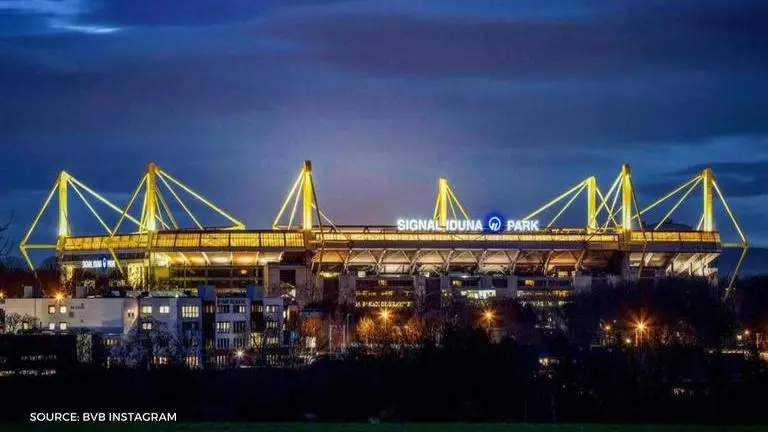Updated 14 April 2021 at 18:56 IST
Dortmund team bus bombing left the 2017 squad pondering retirement after trauma
Dortmund team bus bombing: The 2017 incident had many stars pondering retirement and needing psychological help as three grenades exploded near their team bus.
- SportFit
- 4 min read

Just over four years ago, Borussia Dortmund endured one of their worst nights in club history while on their way to Signal Iduna Park for their Champions League quarter-final tie against AS Monaco. Thomas Tuchel's Borussia Dortmund squad was well rounded and had been doing well domestically and were favourites at home despite the visitors boasting a vastly young and dynamic squad which was soon dismantled by top clubs splashing money. However, what followed was a dark night in European football as three bombs exploded near Dortmund's coach on their way to the Westfalenstadion.
Dortmund team bus bombing: BVB stars were mulling retirement, needed counselling following 2017 incident
In an article by Raphael Honigstein for The Athletic, the entire scenario behind the Dortmund bus attack back in 2017 has been brought into the picture. Honigstein offered insight into the trial behind the attack, the mental and physical state of players, the tensions between Dortmund CEO Hans-Joachim Watzke and head coach Thomas Tuchel. The game was postponed and rescheduled for the following day with Dortmund losing 3-2. The incident saw only one member of the Borussia Dortmund 2017 squad get hurt, with Marc Barta wounded by shards of glass from the shattered bus window.
📆 ON THIS DAY: In 2017, the Borussia Dortmund team bus was attacked with three separate explosives injuring Marc Bartra.
— Footy Accumulators (@FootyAccums) April 14, 2021
Sickening. pic.twitter.com/UqqTXwyBNn
The report reveals that half the team were in shock during the team meeting ahead of their rescheduled game the next day. Watzke in his autobiography, Love: A Life with BVB, had written that the call was taken in consultation with a few players and head coach Thomas Tuchel, and there was a rallying cry for Dortmund to play for democratic freedom. The Dortmund CEO states that the crisis was existential and the likes of Marco Reus and Gonzalo Castro called for the match to be cancelled. Sokratis Papastathopoulos tearfully told a friend later that night the players were "treated like animals". Nuri Sahin told TV reporter Jan Aage Fjortoft that he will never forget the moment, and was unable to think about football until the second half started. He added, "I get goosebumps thinking about the situation in the bus. I will never forget the faces of my teammates, fearing for their lives that moment".
Half of the Borussia Dortmund 2017 squad had been invited as witnesses to the trial, and the likes of Matthias Ginter and Raphael Guerreiro broke down when they took the stand. Ginter, who is now with Borussia Monchengladbach, was also involved during the 2015 Paris attacks and contemplated quitting football altogether. Speaking to SZ-Magazin, he revealed, “Immediately after the bomb, we had to function, there was no time to get to grips with what had happened. But when I had time to think about it over Easter, I realised that I was still in shock".
Advertisement
Goalkeeper Roman Weidenfeller said that some players were still suffering from the ill effects and that he had been seeking psychological help himself as he couldn't help but "jump when there’s a loud noise". Marcel Schmelzer and Sven Bender also had trouble coming to grips with the Dortmund team bus bombing, and later said that it was one of the reasons why he moved to Bayer Leverkusen. Marc Bartra admitted to feeling anxious about sitting close to Sergej Wenergold in the courtroom and having recurring nightmares.
Who is Sergej Wenergold? Dortmund bus attacker was "financially motivated"
Wenergold was charged with 28 counts of attempted murder for the attack. The German was financially motivated and had put up links to the Dortmund bus attack with the ISIS and other terrorist organisations, just to throw off the investigators. He had bought a few thousand euros worth of ‘put options’, essentially betting that the share price of Borussia Dortmund would plummet following the bloodshed he had planned. Wenergold was set to make a couple of hundred thousand euros, at most, from mass murder. In November 2018, Sergej Wenergold was sentenced to 14 years in prison.
Advertisement
(Image Courtesy: BVB Instagram)
Published By : Sreehari Menon
Published On: 14 April 2021 at 18:56 IST
